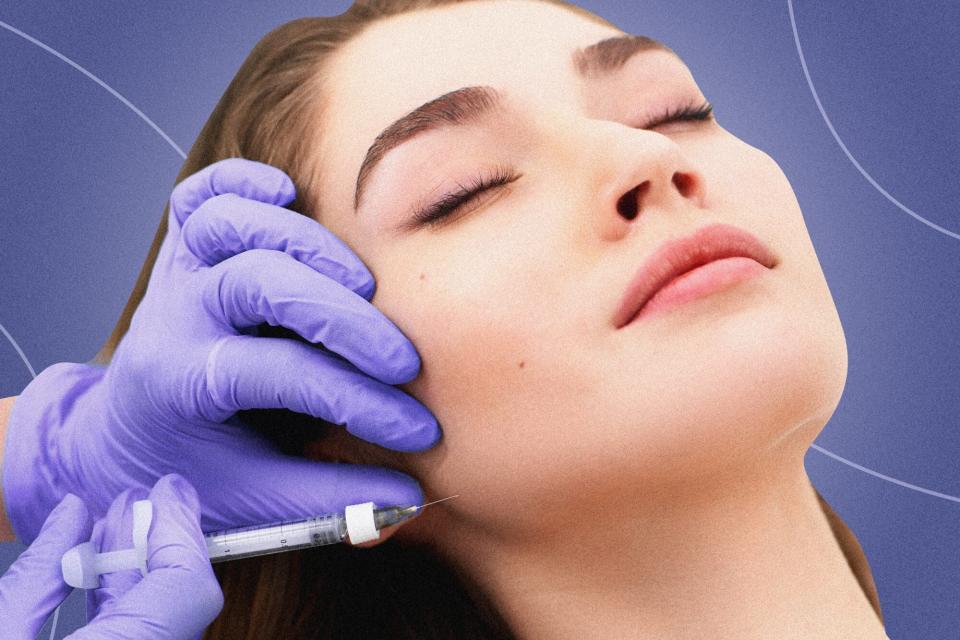I Get Botox for My TMJ, And It's the Best Thing I've Done for Pain Relief

Getty Images/ Kelly Chiello
Like many New Yorkers, I'm a very stressed-out lady. The chaos of Manhattan manifests itself into my very stiff upper back and my jaw.
Subconsciously, I grind my teeth when I'm on deadline, behind on my to-do list, and when I'm overthinking. It doesn't stop when I sleep either. Often I wake up with a sore jaw, which is a result of grinding all night.
The pain ranges from mild soreness to unbearable discomfort. In my efforts to remedy it, I've taken pain killers, practiced gua sha, massaged my jawline, done microcurrent facials, meditated, sipped on relaxing teas, etc. You get the picture. Unfortunately, none of it worked, and the longer the pain went on, the more desperate I became for a real solution.
I had read about the benefits of getting Botox injections to alleviate TMJ-related pain and decided to give it a go. While I frequently get Botox to prevent signs of aging along my forehead, I've only had Botox injections on my jawline once, and that was when I was a wee youth without a worry in the world and didn't really need to do it. Now, with increasing discomfort along my jawline, I felt it was worth trying if it would help me be able to think straight. So, I got it done and learned a lot along the way.
RELATED: 6 Post-Botox Mistakes Way Too Many People Are Making
What Is TMJ?
TMJ stands for temporomandibular joint, which connects your jaw to your skull. People with TMJ disorder usually experience pain, difficulty chewing, clicking, or locking in the jaw area.
What Are the Benefits Of Getting Botox For TMJ?
Dr. David Shafer, a board-certified dermatologist at Manhattan's Shafer Clinic, explains that Botox treatment relaxes the master muscle and decreases stress around the temporal mandibular joint, giving the patient pain relief.
How Do You Know If Botox Is the Right Solution For Your TMJ?
"Anybody with TMJ symptoms is likely a good candidate to try Botox therapy," says Dr. Shafer. "The excellent thing about [it] is that it's quick, easy to administer, low-cost, and if it doesn't work, there is no downside as the Botox wears off over three to five months and there are no residual side effects."
VIDEO: Is Botox Worth the Hype? Here's How Long It Really Lasts
How Much Does It Cost to Get Botox For TMJ?
As with most injectables and in-office treatments, the price will vary depending on the provider, where they're located geographically, and the number of units used. However, Dr. Shafer says his protocol is to start patients off with 25 units per side for a total of 50 units, which he prices at $1500.
How Often Should You Get Botox For TMJ?
"Botox typically lasts three to five months, so a typical treatment regimen would include treatments every three to four months for one to two years," explains Dr. Shafer. However, he notes that after the muscle has been sufficiently weakened over time, some patients may be able to spread out the treatments.
What Else Should You Know About Botox For TMJ?
For starters, it's important to go to a qualified injector. (Note: steer clear of Groupon deals just because they're cheap — do your research.)
Dr. Shafer also says that if a patient only has pain on one side of their jaw, it's still very important to treat both sides of the face with Botox to maintain a normal balance of the musculature. "If you only treat one side, you can throw off the chewing and teeth alignment, which can be frustrating for patients — this is another reason why you should make sure that you were being treated by a well chained and qualified injector," he elaborates.
Lastly, as with any other Botox treatment, don't get another facial treatment for 24 hours to prevent spreading it to other areas of the face. However, Dr. Shafer says that patients can return to their normal routines after that.
My Experience With Botox For TMJ:
As far as I'm concerned, this is the only treatment that works for TMJ pain. Instead of bite guards, which I only use at night and do nothing for my headaches in the morning, Botox helps alleviate the pain 24/7. I notice the difference almost a day after I get the injections, and once it starts wearing off, I can immediately tell. I now go every few months to get a few units injected into each side of my jaw and couldn't be happier and more relaxed. A nice side effect is that my face slims down a little bit, as my jaw no longer produces muscles from grinding — it's not a result I was looking for, but I appreciate the subtle change.

